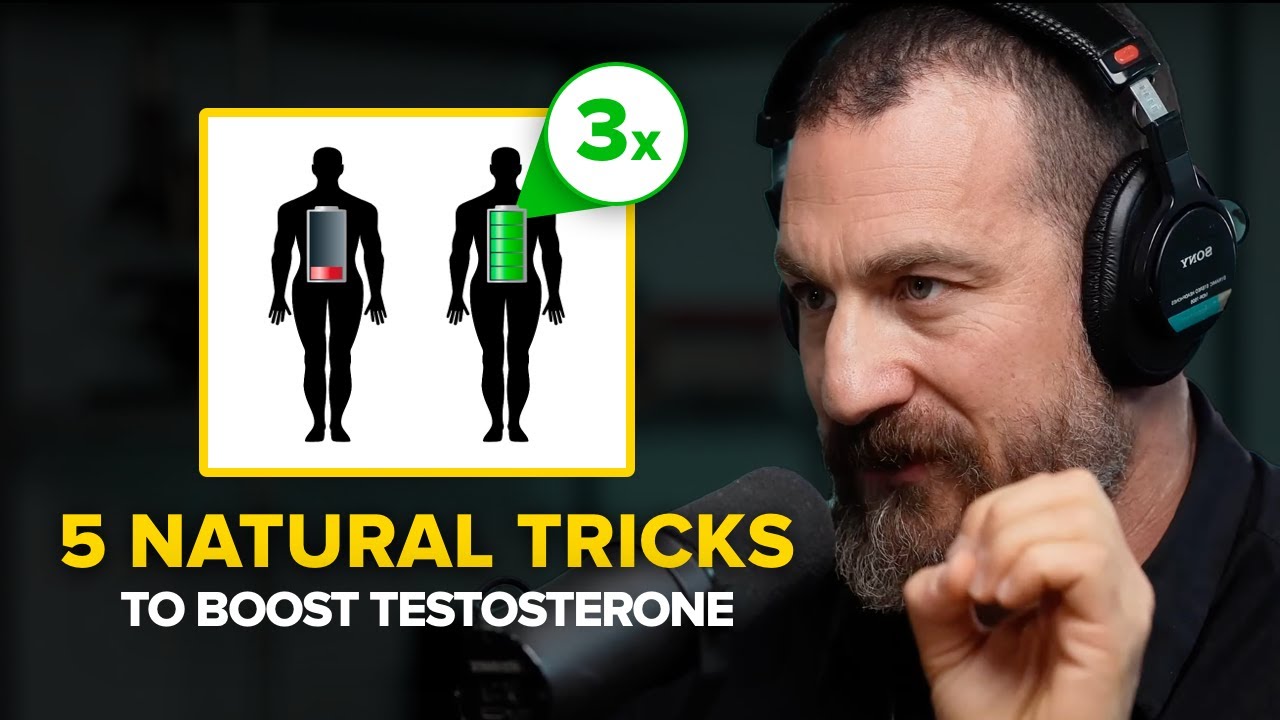DOUBLE Your TESTOSTERONE Naturally With These TRICKS | Andrew Huberman
Summary
TLDRThe video script delves into the intricate relationship between testosterone and dopamine, highlighting how testosterone, originating from the adrenals and testes, enhances the pleasure derived from effort. It discusses the role of cholesterol in either producing cortisol, a stress hormone, or testosterone. The script challenges the myth of testosterone reduction with sleep deprivation, emphasizing the importance of sleep in replenishing testosterone. It also explores the impact of sex and ejaculation on testosterone levels, noting that while sex can increase testosterone, abstinence can further boost it. The discussion extends to the influence of proper breathing, light exposure, and exercise on hormone levels. Lastly, it touches on the effects of supplements like vitamin D, zinc, magnesium, and creatine on testosterone optimization.
Takeaways
- 🔬 Testosterone and dopamine are closely related in the pituitary system, influencing our motivation and the feeling of effort.
- 🌡️ Testosterone is synthesized from cholesterol, which can also be diverted to produce cortisol, a stress hormone, highlighting a physiological choice between stress and effort positivity.
- 💪 The primary role of testosterone is to make effort feel rewarding, which is crucial for motivation and well-being.
- 🤔 While anger can lead to increased cortisol and decreased testosterone, enjoying one's activities can maintain or even increase testosterone levels.
- 🧠 Testosterone is not simply the opposite of estrogen; instead, prolactin is often considered the antagonist of testosterone, promoting a state of rest.
- 🛌 Contrary to some beliefs, sleep deprivation does not necessarily decrease testosterone levels, but sleep is still essential for its replenishment.
- 🏋️♂️ Physical activity, particularly heavy weight training, can significantly increase testosterone levels, suggesting a link between physical effort and hormonal balance.
- 🌞 Proper light exposure, especially early in the day, is crucial for maintaining optimal levels of dopamine and testosterone.
- 🌙 Avoiding bright light exposure at night can help prevent the suppression of dopamine and testosterone, supporting hormonal balance.
- 💊 Certain supplements and compounds, such as vitamin D, zinc, magnesium, and creatine, can influence testosterone levels, suggesting dietary and supplemental strategies for hormonal optimization.
Q & A
What is the relationship between testosterone and dopamine?
-Testosterone and dopamine are closely related in the pituitary system. Testosterone, which comes from the adrenals and testes, primarily makes effort feel good, while dopamine is a neurotransmitter associated with reward and pleasure.
How does the body's production of cholesterol affect testosterone levels?
-Cholesterol can be synthesized into either cortisol, a stress hormone, or testosterone. Since the body has a limited amount of cholesterol, it gets diverted towards either stress or the pathway where effort feels good, which is the pathway linked to testosterone production.
What is the effect of anger on testosterone levels?
-Anger can divert more cholesterol molecules towards cortisol production, leading to stress and a slow depletion of testosterone.
Does sleep deprivation affect testosterone levels?
-Contrary to a common myth, testosterone doesn't necessarily drop with sleep deprivation. However, sleep is needed to replenish testosterone levels eventually.
How can enjoying one's activities impact testosterone stores?
-Enjoying what you're doing can help maintain or even increase testosterone stores, which in turn makes effort feel good and improves the quality of life.
What is the role of testosterone in competitive and foraging behaviors?
-Increases in testosterone promote competitive and foraging type behaviors in humans and non-human mammals. Competitive environments can also increase testosterone levels.
How does sex affect testosterone levels?
-Sex can increase testosterone levels, with the physical act of sex leading to significant increases. However, the act of ejaculation itself does not reduce testosterone levels, and abstinence can further increase testosterone levels.
What is the impact of proper sleep on hormone levels like testosterone and estrogen?
-Proper sleep can offset reductions in testosterone and estrogen, and fertility issues that occur due to lack of sleep. Breathing correctly during waking hours and sleep, and viewing bright light within the first hour of waking are important for optimizing these hormones.
How does nose breathing during sleep affect hormone levels?
-Nose breathing during sleep increases the amount of oxygen intake and carbon dioxide offloading, which can reduce apnea and breath holding, leading to decreased cortisol and increased testosterone and estrogen levels.
What is the role of light exposure in regulating dopamine and testosterone?
-Viewing bright light within the first hour of waking has powerful effects on sleep and wakefulness, which translates to optimizing testosterone and estrogen levels. Avoiding bright light exposure in the middle of the night is also important to prevent suppression of dopamine release.
What are some supplements or compounds that can optimize testosterone levels?
-Vitamin D, zinc, magnesium, and creatine are some compounds that can optimize testosterone levels. Additionally, herbal supplements like Tongkat Ali and Fogia Agrestis can significantly boost free and active testosterone.
Outlines

This section is available to paid users only. Please upgrade to access this part.
Upgrade NowMindmap

This section is available to paid users only. Please upgrade to access this part.
Upgrade NowKeywords

This section is available to paid users only. Please upgrade to access this part.
Upgrade NowHighlights

This section is available to paid users only. Please upgrade to access this part.
Upgrade NowTranscripts

This section is available to paid users only. Please upgrade to access this part.
Upgrade NowBrowse More Related Video

Neuroscientist: "TRIPLE Your Testosterone Levels" | Andrew Huberman

The Male Crisis - Heat is Wrecking Testosterone

Neuroscientist: Supplement That Makes Your TESTICLES Grow | Andrew Huberman

Understanding the intricacies of Testosterone (masculinize yourself)

Spermatogenesis | Blood-Testes Barrier | Hormonal Control | Structure of Sperm || Reproductive Physi

Is Cycling Training Lowering Your Testosterone and What Can You Do About It? The Science
5.0 / 5 (0 votes)